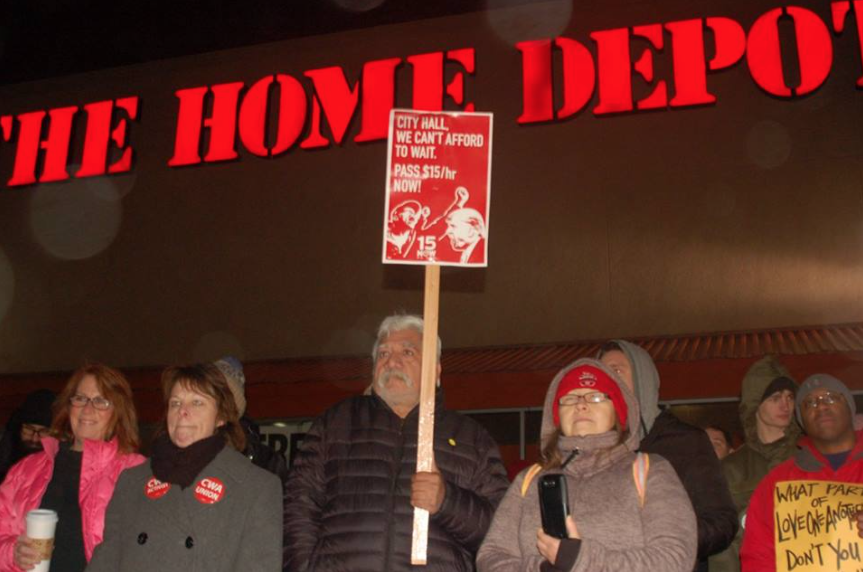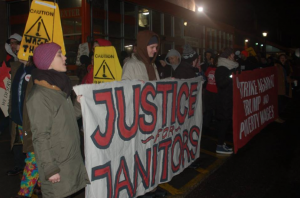
CTUL workers on strike outside of Home Depot in Northeast Minneapolis on Jan. 20, 2017. (Photo courtesy of CTUL)
This story is part of Sarah Jaffe’s new series Interviews for Resistance, in which she speaks with organizers, troublemakers and thinkers who are doing the hard work of fighting back against America’s corporate and political powers.
On Friday, Jan. 20, as Donald Trump was being sworn in as president, workers in Minnesota went on strike. They were cleaning staff at Kimco, an Atlanta-based company with 7,200 employees nationwide, that cleans Home Depot stores. Their strike targeted not only the subcontractor, but Home Depot and Trump himself as well.
In this edited post, Jaffe speaks with Veronica Mendez Moore, director of Centro de Trabajadores Unidos en Lucha (CTUL), about the strike and the potential for challenging corporate power under Trump.
Sarah Jaffe (SJ): Can you tell us about the campaign that led to the Inauguration Day strike? Why strike against Trump?
Veronica Mendez Moore (VMM): This is a campaign that has been going on for about six years. Earlier this year, we celebrated a tremendous victory of workers that clean Target stores, Best Buy, Macy’s stores, that actually won a union and now have a voice on the job and are able to start bargaining their first contract. That was a tremendous leap forward. Minneapolis–Saint Paul is the first major metropolitan area in the country where that industry is unionized. That is extremely exciting.

Luciano Valbuena speaks at the strike. (Photo courtesy of CTUL)
At the same time, there is still one major company that is left out of that because they have refused to talk to us, they have refused to engage at all with workers, and that is a company that cleans Home Depot. The company is called Kimco. We have been organizing with these workers and are going to continue organizing with them so that they can have a voice on the job.
As we know, Trump has an agenda that is very anti-worker, anti-immigrant, anti-women, anti-most of our community. We think it is critical that we stand up and resist that… [On Friday] many people will be joining us on the picket line and workers that clean Home Depot, which is owned by people who are significant Trump supporters, financially and publicly. We are going to strike against poverty wages and against Trump’s agenda. That is the agenda that is likely to take away many of the rights that workers have been fighting for for years.
SJ: Why it is important for Latino workers, immigrant workers and undocumented workers to take part in a strike like this against Donald Trump?
VMM: I think it is important for all workers to resist. Even before Trump, we have seen corporations have massive, skyrocketing profits while workers are getting paid less, getting hours shaved off of their checks, and being asked to do more in the same amount of time. And it’s only going to get worse. I don’t see any other path but to stand up and resist. All workers need to stand up and say, “We are not going to take this anymore. We are going to strike right now, before you start to attempt to implement any of your new agenda.”
SJ: Talk about the particular power of the strike and what role you think it will play going forward in resisting that agenda.
VMM: I think it is going to be critical. I think over the last couple of years we have seen more and more workers standing up and getting past fear to take actions and improve their lives and their communities. Look at the Fight for 15 and fast-food workers that have been organizing — we are also part of that national campaign, the retail janitors here, and workers in many industries across the country that are all starting to stand up.
That is the engine of our economy. If workers don’t work, our economy doesn’t work, their communities don’t work, and it begins to break down for the corporations. I think the strike is such a critical tool because it really is a tremendous amount of power that workers have. The bosses spend hours and hours coming up with strategies to teach workers that their voice doesn’t matter and that they have no power and that they just need to follow the rules and listen to the boss. Our job is critical to help people understand how much power they actually have and that the strike is the most powerful tool they have to be able to use their voice and their power.

CTUL workers on strike outside of Home Depot in Northeast Minneapolis on Jan. 20, 2017. (Photo courtesy of CTUL)
SJ: Let’s backtrack a little bit and talk a little bit more about the organizing that you have been doing with these subcontracting companies. Explain that for people who are not familiar with the way that works and the role the big companies, the Targets and the Home Depots, play in this whole economy.
VMM: Many decades ago, workers who cleaned a store like Target or Home Depot were actually employed in-house. If you look at supermarkets that are primarily union, that meant that the cleaning workers were union. Then, some maybe 30 or 40 years ago, that changed and they began to subcontract out the work. They did that because it is less responsibility and at the end of the day it is cheaper. They subcontracted out the work to many different companies. What we saw when we started taking on this industry was you have one big retail store and they have 25 different smaller contractors that are vying for the contract with that store. What do they do? They underbid each other. It’s a race to the bottom.
We saw that about 15 years ago, workers who were working in retail janitorial were making about $10 or $11 an hour and there were about four or five workers cleaning a store. Then, you fast forward after all of this race to the bottom, to about five years ago and workers are making $7.25 and there are two or three workers cleaning the store. So the wages have gone down and the workload has doubled. That is when we got engaged in the campaign.
It is just very clear who holds the power in those situations. The contractors do not hold the power. We need to look the retailers to play a leadership role if we are going to change the industry. That is, when through our work and workers striking and organizing and seeking dialogue, we were able to engage Target and did all of the responsible contractor policy that Target then implemented. This got workers on a path so they could join a union.
SJ: One of the tactics that we have seen work in recent months and years is targeting the reputation of these big brands. We saw this around pressuring the big brands around HB2 in North Carolina and the work that you do leverages that in a different way. What kind of lessons are there from that to think about, again, stopping the most hellacious things that the Trump administration can push for? Is there a way to leverage power against these corporations to then, in turn, have them pressure the federal government?
VMM: I think it really comes down to building a base of workers that are ready to stand up and tell the truth. Because all of the companies that have images that they want to protect, the image they are trying to protect is an image of goodness. It is an image of being an asset to communities. It is an image of being a good place to go shop, or whatever the business is. That is the image they want. There is so much truth to tell underneath that about how that is not what they actually are and all of the ways workers are getting squeezed and squeezed more and more every year. What we have learned is that it is about telling the truth and building a base of workers that is willing to stand up to the repression. That happens when workers start telling the truth.
SJ: You have done a lot of work around the Fight for 15, and Trump’s Labor Secretary Nominee, Andrew Puzder, is literally a fast-food CEO. What has been the response of the workers that you work with to that nomination? What does that look like going forward?
VMM: It is a horrifying prospect to think that somebody who, we know, in their own business has a significant amount of wage theft and all kinds of other problems within their company, that is a person that could be in charge of making sure that workers have rights on the job. That is a horrifying prospect. We, and many other different organizations around the country, have been digging into that and really identifying some of the problems that exist in the stores and want to highlight that to make sure that the truth is told.
Workers at Hardee’s stores and at Carl’s Jr. stores across the country are going to be taking action and turning into the Department of Labor all of the violations that are being found in their stores around sexual harassment and about retaliation of the workers organizing. There are so many problems happening just within his companies. Imagining him having that position is just absurd.
SJ: Is there anything else you want people to know about the work CTUL is doing, the organizing that workers are doing around the country to resist this?
VMM: I think we have had a lot of really important victories that are moving things forward nationally and on the cutting edge, but there is so much more work to do. What the future holds for us at CTUL is really looking [not only] to “How do we not just organize the workers here and the workers there?” but, “How do we actually start organizing and restructuring our economy such so that workers can actually be in dialogue with the people who control our economy, with the 1 percent of Minnesota, of Minneapolis, of the country, who are actually the ones who, right now, have all of the power?” That is the real question and that is what we are going to make strides for over this next year.
Interviews for Resistance is a project of Sarah Jaffe, with assistance from Laura Feuillebois and support from the Nation Institute. It is also available as a podcast on iTunes. Not to be reprinted without permission.




